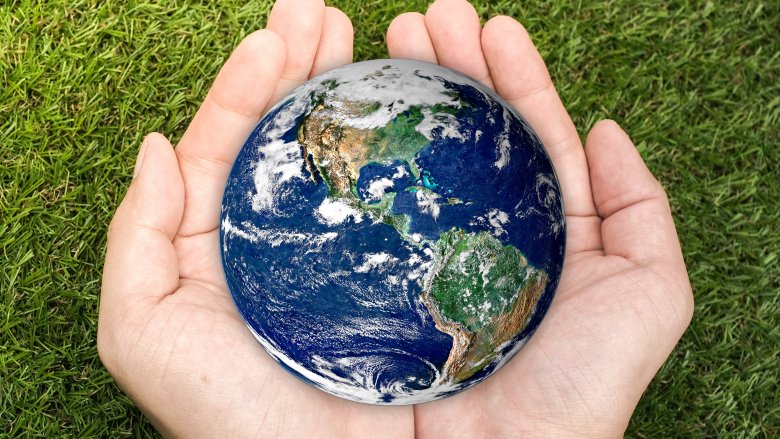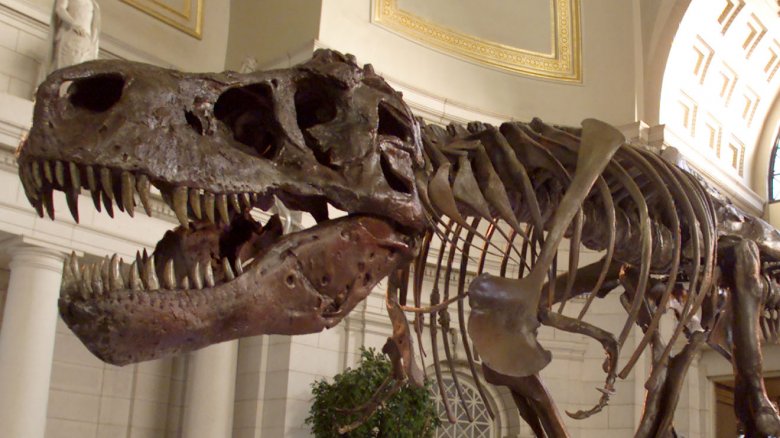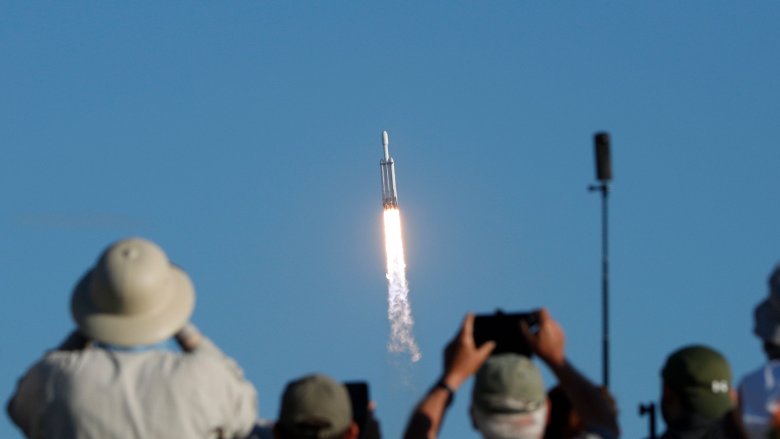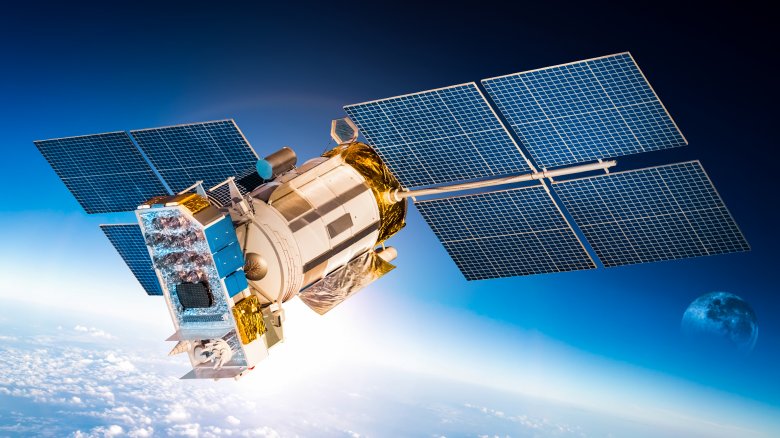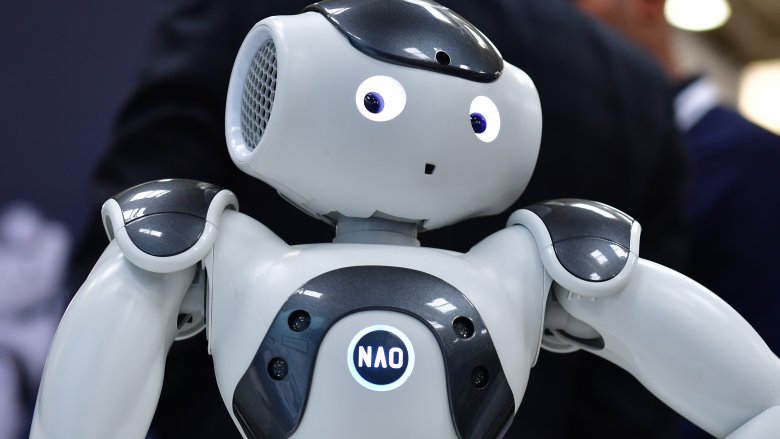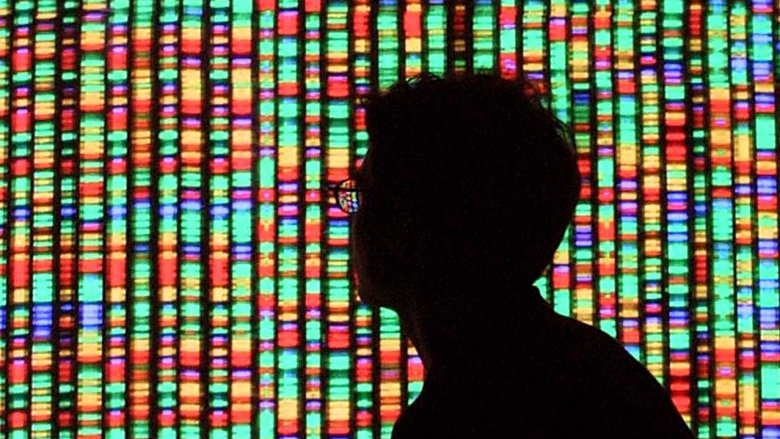Brutally Honest Predictions Of The Future Most People Don't Want To Hear
Predicting the future is always guesswork, seeing as half the time we can't even make accurate weather forecasts. Who could have guessed a few decades ago just how much the internet alone would shape today's world? But that doesn't mean people aren't trying to anticipate the strange things that may or may not wait behind the corner. Plenty of the world's finer minds have taken a look at current trends and developments and created strange predictions about what life might be like in the (often uncomfortably near) future.
Some of the following visions of the future seem pretty far-fetched, others are almost guaranteed to take place, while others yet could go any which way. Still, they all have one thing in common: We'd all probably feel better if they were very, very inaccurate. Let's take a look at some of the most brutally honest predictions of the future that you'd probably prefer not to hear.
The sixth mass extinction
Mass extinctions are terrifying events that end a huge percentage of life on Earth. As Cosmos Magazine tells us, there have been five of these so far, and with assorted combinations of climate change and natural disasters, they've all managed to wipe 75% or more of species off the face of the planet. The fact that there have been five heavily insinuates that there'll eventually be a sixth one, and as Science Mag points out, it's ... already taking place? Whoops.
Dr. Richard Leakey of IUCN agrees that the world is currently taking its first steps toward the largest mass extinction since the dinosaurs died — only this time humanity plays the part of the comet. Physics World points out that about a million of the world's species may face extinction thanks to human actions, which have affected an estimated 75% of land and two thirds of marine environments in various, often negative ways.
That's all pretty depressing, and to be fair, there's no way to make it sound much nicer. Still, to put things in perspective: In the grandest possible scheme of things, mass extinctions are part of the natural order. They've happened multiple times before without us around to kickstart the process. Life, in general, is almost certain to persevere — after all, we're here despite all the mass extinctions that came before us.
Still, it might be worth being extra nice to endangered species from here on out.
Antibiotics might stop working
It's hard to overstate how important antibiotics have been to modern medicine. However, according to the Independent, there's a very real chance this might soon end. We've been over-prescribing antibiotics so much that the drug buildup in our systems has given some bacteria the ability to build up resistance and become "superbugs". It doesn't help that the food industry commonly feeds antibiotics to livestock to prevent infections, which further increases the buildup in our systems — and antibiotic resistance in infectious bacteria.
According to the BBC, the superbug situation is starting to be, well, superbad. If we don't significantly cut down our rampant use of antibiotics, there's a chance that one day they just won't work anymore. That's when common infections and small scrapes would become potentially lethal, and chemotherapy and surgeries dangerous or even impossible. Dr. Margaret Chan, the Director-General of the World Health Organization, has even said that the post-antibiotic era might be "the end of modern medicine as we know it".
Fortunately, this hasn't happened yet, and even the less moral and more greedy parts of humanity have a pretty big incentive to try and put a stop to it before it's too late: Money. Experts have said antimicrobial resistance will eventually become a bigger threat than cancer, and its effects on the global economy would be massive. Get to work, Big Business! Got to save those profits, right?
Private space travel trouble
Any way you look at it, the era of space race between nations is giving way to commercial space travel. Axios tells us we're heading toward a future where Jeff Bezos, the richest man on the planet, wants to pave the way for a trillion humans to colonize the solar system, and Elon Musk has turned his wandering eye toward Mars. However, rich people's projects tend to require rich people money, and the price tag for private space travel will be so hefty that we might as well live in one of those dystopian movies where the rich are free to escape the Earth as the rest of us are left slowly drowning in man-created filth. According to the New York Times, the current trends of space travel certainly seem to be targeted for the super-rich. Richard Branson's Virgin Galactic offers spaceship rides for the modest price of $250,000, and a company called Axiom Space is planning to build a commercial space station where you can stay in a phone booth-sized "luxury" cabin for $50 – $55 million.
Of course, these are merely the initial stages of commercial space travel, so it's likely that the rich people pioneering private space travel are blazing the trail for something truly groundbreaking and, more importantly, affordable. After all, cars were rare and expensive until the Ford Model T made them affordable for the masses, so who knows? Maybe we'll all ride mass-produced space cars in a few generations' time.
Our food might be scum and bugs
At some point, the way we eat has to change. As the United Nations Environment Program notes, population growth, climate change, and evolving food preferences indicate a need to rethink our food system in a radical way just to keep people fed. According to National Geographic and CNN, some of these changes may be unsavory: instead of a delicious burger, your future meal might contain pond scum and bugs.
Strains of algae, a.k.a. that green photosynthetic muck in unattended ponds and pools, might eventually be a major source of nutrition. You can already have it in the form of smoothies, chips, protein bars and the like, and while it's relatively easy to grow because it doesn't require fresh water, it has a mossy flavor that's said to be unpleasant. Fortunately, scientists have also developed algae oil and butter, which have a more neutral taste. Meanwhile, bugs are excellent protein sources and can even be delicious after you get over the yuck factor. The most likely future superstar of the bug food world is the cricket, which is considered the tastiest bug out there, and can also be ground into an unrecognizable, flour-like protein powder that can be mixed with virtually anything.
Still, if these "future foods" seem icky to you, don't worry — science is also developing delicious plant-based meat alternatives and even lab-grown chicken, so chances are you'll get your fill of (more or less) classic proteins if crickets aren't your thing.
Satellite destruction
A surprising amount of modern technology relies heavily on the existence of satellites. According to io9, the destruction of all (or even a significant portion) of the satellites up in orbit would promptly send us halfway back to tech stone age, massively limiting communications and destroying GPS. This would create a domino effect that could take out the internet, TV and radio, render credit cards and ATMs useless, and inhibit good chunk of military operations.
Unfortunately, there are ways this might happen. A huge solar storm could create a powerful geomagnetic tempest such as the Carrington Event of 1859, which might have fried all orbiting devices if they'd existed back then. There's also the chance of Kessler syndrome, where a chain reaction of space debris collisions would escalate into an orbiting blender of doom that takes out everything in its path.
To be fair, massive solar storms and the like are way too force majeure to count as likely scenarios. Unfortunately, they're not the only thing that can take out satellites — humans can, too. In 2019, India unveiled their new anti-satellite missile system, which, according to the Verge, can destroy orbiting satellites from Earth, potentially creating problematic space debris. Wait, what was it again about the Kessler syndrome?
China might dictate where the future is going
The future belongs to China, at least if you ask China. According to the Independent, President Xi Jinping opened the National Congress in 2017 with a plan that aims to make China a "global leader" by the year 2050. Jinping's three-and-a-half-hour speech stated aims to become a leading force on virtually every front, from the worrying (political, economic, and military) to the vaguely positive ("making greater contributions to mankind").
As daunting as the rise of an all-encompassing new superpower may be, China's ambitious plan is by no means set in stone. As Bloomberg points out, China is already an economic superpower, and will likely grow to dominate Asia. However, the country faces large economic and financial challenges within its own borders, which could endanger its global ambitions. China also has a much smaller diplomatic network than, say, the U.S., and its network of formal alliances (which is crucial for a superpower) is small even within Asia — even North Korea has more names in its "close contacts" folder.
Finally, Foreign Policy mentions another important obstacle between China and global dominance: The country simply isn't very cool. China has precious few international celebrities, and its pop culture doesn't hold much sway abroad. This lack of "soft" global power strips them of the ability to slowly influence the rest of the world into thinking that China rules, and therefore enabling it to eventually do so ... on the cultural front, at least.
The job market might turn us all to drugs
Here's a claim that's straight-up dystopian: The future job market might be so competitive and demanding that everyone relies on performance-enhancing drugs. A job where you have to dope up just to stay on the level is no one's idea of a good time, which makes the findings of the European Agency for Safety and Health at Work's study on the topic all the more worrying. After looking into the "increasingly competitive society and working environment," the agency anticipated that the use of cognition enhancer drugs will rise in the future as people attempt to keep up. HR Magazine also raises the possibility of "smart drugs" as an innate part of "performance-focused workplaces," and points out that the drug-fueled "superworker" is pretty much the epitome of the commitment- and productivity-focused 24/7 availability culture many contemporary businesses already expect.
Of course, just because work-related agencies and publications speculate that something might happen doesn't mean it actually will. Though widespread work-related drug use is a disconcerting possibility, HR Magazine also points out that "extreme" workers such as emergency service personnel, military members, and medical staff have reportedly used performance enhancers for many years, so the phenomenon isn't exactly new — and besides, proof that people are actually smart-drugging themselves for better work performance "is inevitably limited and anecdotal." Besides, it could be argued that drugs are already an innate part of most workplaces. We just call our current chemical supplement of choice "coffee".
Robots will learn to manipulate us
Humanity has a strange relationship with robots. Sure, they help us with all sorts of unpleasant tasks, but on the other hand, Terminator. As long as we can command them, things are fine, but what if they learned to manipulate us? Perhaps they already can.
According to Plos One, researchers from the University of Duisburg-Essen published a study in 2018 that shows robots can indeed influence us, at least to a degree. Their experiment made 89 volunteers interact with "Nao", a cute, humanoid assistant robot. The volunteers thought their mission was "to improve the robot's interaction capabilities by testing a new algorithm," but in reality, researchers sought whether the robot could push the humans' emotional buttons when the experiment participants were required to switch it off. It could, too: A desperate, robotic plea of "No! Please do not switch me off!" was enough to make the participants hesitate, and some of them even outright refused to turn it off — merely because Nao had asked them.
Don't start calling Sarah Connor quite yet, though. According to the study's co-author, Nicole Krämer, who spoke with NBC News, Nao hasn't really figured out how to manipulate humans (at least not yet, dun dun dunnn...). Instead, Krämer suggested that humans are hardwired to react to certain "social cues" regardless of whether they come from a robot or a person, so we tend to treat sufficiently conversational robots more like people than mere appliances.
Gene editing weirdness
As New Scientist will tell us, the CRISPR gene editing method is a revolutionary, futuristic way "to create new varieties of animals and plants, and develop treatments for a wide range of diseases." The technology can even be used to edit human beings ... which Bloomberg says is "inevitable," considering a Chinese scientist already allegedly used CRISPR in 2018 to make two babies "resistant to HIV." There's just one little problem: Gene editing might give you cancer.
Research from 2018 indicates that CRISPR editing is not quite as precise as previously thought, and instead of altering a small handful of DNA letters in a specific cell to disable certain genes, the method can actually affect hundreds, even thousands of letters. This is a problem because some of the CRISPR editing methods under development will involve "[editing] billions of cells inside the human body," and if the changes in the cells' DNA letters are as huge as research indicates, there's a chance some of those altered cells will become cancerous.
While genetically edited cancer sounds like something out of a futuristic horror movie, it's good to remember that this technology is still in testing stages. Terrifying kinks like this will likely be ironed out well before every home gets its own CRISPR gene-o-matic, or may just turn out to be false scares. Let's hope it's the latter, if only because of that Chinese scientist's babies.
Lots of famous cities will be a lot wetter
The city of Venice, which would be slowly sinking even without the rising sea levels, currently floods over 60 times a year as opposed to the four or so times a year in 1900, according to Quartz. As such, the port city is trying to fight the sea with an elaborate storm gate system called MOSE. Unfortunately, some experts question the effectiveness of the system, and have even predicted the sea will claim Venice by the year 2100.
While that's still plenty of time to figure out a solution for aptly nicknamed "Floating City," the Guardian tells us it's far from the only city to suffer from the effects of sea level rise via global warming. Large "swaths of [Japan's] Osaka" could disappear underwater, displacing an estimated 5.2 million people, and threatening the local economy. Alexandria in Egypt is another potential victim of the slowly rising seas, with an estimated three million people (not to mention the historic city itself) at risk of at least being "partially submerged by 2070". Rio de Janeiro is also at grave risk, and Miami and Shanghai would ... essentially cease to exist. Ouch.
Fascism might be due for a huge comeback
Fascism is a term that's thrown around a lot these days, to the point that ABC News reports political scientists are wondering whether there could be some sort of system to measure a "fascist minimum" so people wouldn't just use the word to describe political rivals. Still, this doesn't necessarily mean real fascism isn't still out there, plotting to make a big-time comeback. As Vox tells us, this theory is championed by none other than seasoned diplomat and former Secretary of State Madeleine Albright (above), whose 2018 book Fascism: A Warning delivers some frightening insight about the phenomenon.
Albright doesn't label just anyone fascist — for instance, she doesn't think President Donald Trump is one, though she does call him "anti-democratic," and appears to see him as a symptom of the current "erosion of liberal democracy" sweeping the globe. Rather than an ideology, Albright sees fascism as a violent process of gaining and holding on to power by siding with an angry majority by opposing a smaller group. She specifically names Viktor Orbán's "embrace of ethnic purity in Hungary" as an example.
Fortunately, Albright doesn't exactly claim that we'll all plunge into an eternal pit of fascism any day now. She makes a point of mentioning that fascism has been put down before, and that she thinks the resurgence she warns about is more of a "moment" than a "trend".
Data privacy might be a thing of the past
What's the future of privacy in a world where personal data can be stolen, online ads are tailored to the user, and social media users reveal every inch of their personal life to the world? Not great, if you ask the Guardian, who pointed out the vast amount of information companies like Google and Facebook collect, or the BBC, who warned against incidents such as the Equifax hacking in 2017, where a data breach of a single credit rating agency sent the extremely personal data of 145 million Americans out in the hands of bad actors.
According to Forbes, only one thing is certain: "The amount of data that we continue to produce, store and share online will only continue to grow." Beyond that, it's anyone's guess what could actually happen. Forbes speculates the assorted data security features many companies are developing will eventually lead to massive "decentralized" ID systems that help eliminate data breaches, but require you to store your data within the system. This might mean you either take the convenient route and opt in with a major company, who protects your data but has constant access to it themselves ... or you refuse to turn over your data, but are at risk of potentially losing your login credentials because of verification issues.
